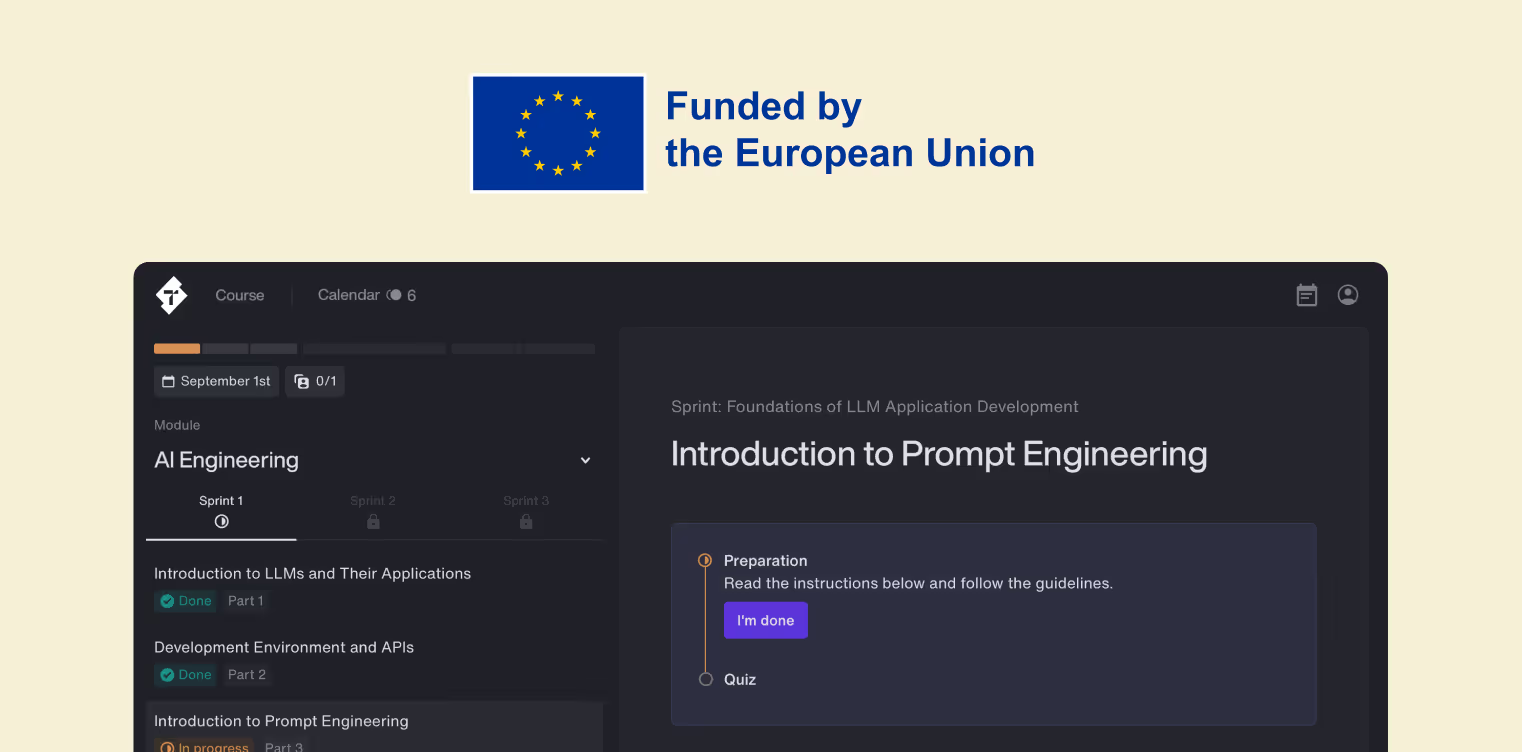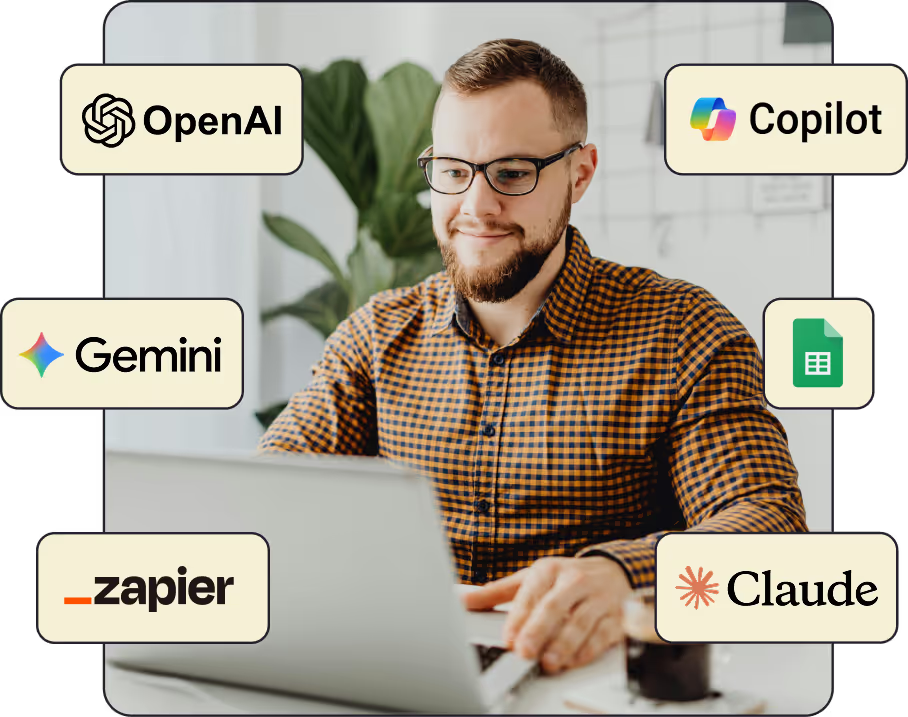+150 mentors from top tech companies







“AI-intensive sectors, such as services and IT, are experiencing productivity growth nearly 5x faster than less AI-focused industries.”
Master AI tools and transform your work
AI is no longer optional — it's the key to staying competitive and delivering value in any role. With the AI for Business Analytics course, you’ll learn the tools and strategies to make data-driven decisions and boost productivity, gaining a powerful edge in your career.
Is it for me? Yes, if you’re:
Working professional looking to upskill
Looking to increase productivity with AI
Analyst or decision-maker wanting to integrate AI tools in your processes
Online-Weiterbildung Künstliche Intelligenz & Business Analytics
Du möchtest deine Kenntnisse in Künstlicher Intelligenz ausbauen, sie gezielt für Business Analytics nutzen und damit deine Produktivität steigern? Mit unserem KI Kurs lernst du in nur 3–4 Monaten (bei ca. 9 Stunden pro Woche), wie du AI-Tools wie ChatGPT, Google Gemini und Microsoft Copilot produktiv einsetzt – ob im Finanzbereich, im E-Commerce oder in der Datenanalyse. Die KI Weiterbildung ist vollständig online, flexibel und mit persönlichem Mentoring ausgestattet.
What can you expect?

Self-paced learning and flexible schedule
Learn at your speed, anytime. Move as quickly or steadily as you need — although we recommend 9 hours a week to keep up with deadlines. Access materials 24/7 and adapt your learning to your lifestyle.

Job-ready AI skills
Get hands-on experience with top AI tools like ChatGPT, Google Gemini, and Microsoft Copilot. Gain practical skills to boost your work performance from day one.
Experience with practical projects
Build confidence solving real business problems with feedback from mentors. In five industry-relevant projects (about 120 hours of learning), you'll use AI to solve the exact kind of problems you'll face at work.

1:1 mentoring
Get detailed feedback from industry mentors on each project.

Supportive community
Join a close-knit community of curious minds who genuinely want to see each other succeed. Share your journey, get advice from mentors, and build real connections that go beyond just networking.

Industry-recognized certification
Get a Turing College certification that proves your ability to use AI in real business settings. It’s concrete proof you can drive results with AI tools, something employers are actively looking for right now.
AI tools and languages you’ll use
Program outline
This course, created by senior AI and analytics professionals, combines focused sprints with hands-on projects. Each sprint is a brief, intensive learning session, followed by practical tasks.
Introduction to AI and Common Use Cases
Start by building a strong foundation in AI and its essential tools. You’ll explore the history of AI, the types of AI in use today, and get hands-on with tools like ChatGPT, Google Gemini, and Microsoft Copilot. You’ll also learn prompt engineering and discover how to supercharge your spreadsheet work and data visualization with AI.
AI for Accessing and Communicating Data
Turn complex data into clear insights using AI. You’ll gain practical experience using SQL with AI assistance to access and manipulate data, and learn to communicate insights effectively. Through hands-on work with GPT-4o image generation tool, Midjourney and custom GPTs, you’ll practice creating engaging content, adapting your messaging for different audiences, and keeping a human touch in AI-assisted communication.
AI for Analytical Insights
Learn how to use AI to really get to know your customers. This module covers practical techniques like customer segmentation, cohort analysis, and retention strategies. You’ll also learn data analysis methods such as A/B testing, funnel analysis, and customer lifetime value (CLV) to turn data into decisions that keep customers coming back.
AI for Automation
See how AI is changing the game across industries like finance, healthcare, and customer service. You’ll learn how to use AI tools as coding assistants, check AI-generated work, and know exactly when (and when not) to use AI. This module also covers AI ethics and data protection, so you can use these tools confidently and responsibly.
Examples of projects
Explore and clean the dataset in spreadsheets or SQL to gather insights.
Run A/B tests to compare user behavior and calculate key performance indicators (KPIs).
Explore no-code environments, such as Zapier, for automating workflows.
Discover the best approaches to data cleaning by using effective formulas and tips for Google Sheets or Excel with AI assistance.
Visualize results in a table or graph format and suggest further analyses.
Understand how to utilize Python for automation tasks.
A unique learning experience powered by technology
Online learning is tough when you’re left on your own. That’s why we built Intra, our learning platform that combines the best of both worlds: human support and smart structure. We’re also developing adaptive AI features to further personalize learning so that, in the future, your journey will adjust closely to your pace, needs, and progress.


Learn from professionals
Our Senior Team Leads and mentors are experienced professionals who are 100% up-to-date with the industry trends and will provide you consultations, 1on1 project reviews, and feedback.

Flexible graduation: you set the pace
Die Kursdauer beträgt 3–4 Monate, abhängig davon, wie viel Zeit du investierst. Du kannst jedoch schneller fertig werden, wenn du intensiv lernst. Am Ende erhältst du ein Turing College Zertifikat, das bestätigt, dass du KI-Tools im Business-Kontext sicher einsetzen kannst – ein wertvoller Nachweis gegenüber Arbeitgebern.



Our learners were hired by top companies




















































How application works
Our application process consists of three steps:
Application
You’ll complete an application form, sharing your personal and academic background with us.
Video/audio recording
You’ll record your answers to a few questions so we can assess whether the AI for Business Analytics program is the right fit for you. Don’t worry – you don’t need to prepare much. You’ll have time to think through your answers and you can re-record if needed. We’ve implemented and certified this step to ensure we admit the most suitable candidates.
Interview
You’ll have a short interview call with our admissions manager to make sure you’ll get the most out of the program.
Basic admission requirements:
Focused hours
Focused hours are:
- Working on a computer (not a smartphone)
- Uninterrupted working time in a dedicated space
- Rested, not overworked (not after intense cognitive work)
Strong motivation
You need a clear and strong reason for joining this program. It should be your personal goal, and you should have specific reasons for wanting to improve your skills.
Good English skills
You must demonstrate an English proficiency of at least B2 level to join the program.
Up-to-date computer
You’ll need a computer that can handle large datasets smoothly and runs an actively supported and updated operating system.
Flexible payment and funding options
You’re resident of:
Education voucher (Bildungsgutschein)
Best for
German residents eligible for a Bildungsgutschein
Course duration
Fixed, 3 months
Time commitment
30 h per week
Price
With a Bildungsgutschein
Upfront payment
Best for
Learners who want the lowest total price by paying upfront
Course duration
Flexible, 3-4 months
Time commitment
15+ h per week
Price
Installments
Best for
Learners who prefer to split self-payment into monthly installments
Course duration
Flexible, 3-4 months
Time commitment
15+ h per week
Price
UZT funding
Best for
Lithuanian residents eligible for UZT funding
Course duration
Fixed
Employed: 2.5 months
Unemployed: 1.5 months
Time commitment
Employed: 11+ h/week
Unemployed: 30+ h/week
Price
Note: UZT-financed groups are temporarily paused due to funding model updates. Apply to join the priority list — we will notify you as soon as funded groups reopen.
Upfront payment
Best for
Learners who want the lowest total price by paying upfront
Course duration
Flexible, 3-4 months
Time commitment
15+ h per week
Price
Installments
Best for
Learners who prefer to split self-payment into monthly installments
Course duration
Flexible, 3-4 months
Time commitment
15+ h per week
Price
Upfront payment
Best for
Learners who want the lowest total price by paying upfront
Course duration
Flexible, 3-4 months
Time commitment
15+ h per week
Price
Installments
Best for
Learners who prefer to split self-payment into monthly installments
Course duration
Flexible, 3-4 months
Time commitment
15+ h per week
Price
We have limited seats. Apply now!
Starting dates
January 12th
Deadline for applications:
2026-01-05
February 9th
Deadline for applications:
2026-02-02
Our graduates have achieved life changing growth. You can too.

Turing College has been a great experience. I loved the structure and content of the material. I had constant contact with instructors and peer learners. I find the peer and senior review concept really efficient.
FAQ
How likely am I to get the EU resident scholarship?
Your chances of receiving the scholarship depends on several factors:
- Residency. You must live in the European Union.
- Performance in the interview. You need to demonstrate a strong drive to learn and grow, both during the program and in your future career.
- Commitment. You should have a clear intention to work full-time in a related industry after completing the program. You also have to be able to dedicate at least 20 hours per week to your studies.
- Competition. The scholarship is awarded to the top 5% of applicants. Your chances of receiving the scholarship will depend on the performance of other applicants in the interview process.
If you meet the residency requirement, showcase your potential and commitment during the interview, and rank among the top 5% of applicants, you will have a good chance of receiving the scholarship. However, please keep in mind that the competition is really high.
What if I haven’t heard from Turing College within 24 hours of applying?
If it's been more than 24 hours since you submitted your application and you haven't received a response from us, here's what you can do:
- Check your spam/promotions folder. Sometimes our emails can get lost, so take a look to see if our message ended up there by mistake.
- Reach out to us via live chat. You’re already on our website, so click on the chat button at the lower right-hand corner of your screen. Our friendly team is always ready to help you out and make sure your application gets the attention it deserves.
In what cases can I lose my scholarship, and do I need to pay it back?
Our scholarship terms are designed to attract dedicated learners who are passionate about careers in data analytics. To keep your scholarship, here are a few things to keep in mind:
1. Job search and hiring conditions:
a. During your studies and for one month after you graduate, you’ll need to inform Turing College before applying to any company (including our hiring partners). This way, we can give you personalized advice and support to help you find the perfect opportunity. One month after graduation, you’re free to apply anywhere without checking with us.
b. If one of our hiring partners offers you a job that meets your expectations (we'll provide you with the salary range beforehand), we expect you to accept it unless you have a good reason not to. An example of a good reason would be you accepting another offer from a hiring partner or some unexpected requirements like relocation being added to the offer.
2. Keeping up with your learning pace:
For you to graduate from Turing College in a reasonable timeframe, we define a minimum learning pace requirement. We have seen that only by maintaining a consistent pace can students successfully graduate from Turing College. The minimum learning speed for students who receive a 100% scholarship are as follows:
- For our Data Science program, your average learning speed should not be slower than completing a sprint in 3-4 weeks on average. This equates to finishing 3 modules in 9-11 months;
- For our Data Analytics program, you should complete 4 modules in 8-10 months.
- For our Digital Marketing & Analytics program, your graduation is expected within 6-10 months.
Violating one of these conditions will lead to termination of your scholarship. If a scholarship is terminated, you will need to return the full amount of the scholarship you have received. We implement these scholarship terms to ensure we attract students who are serious about pursuing careers in a related field to their program.
How likely am I to get a full scholarship?
Your chances of receiving a full scholarship depend on several factors:
- Motivation: You need to show strong motivation to create AI-driven solutions, either within your company or as part of your own startup.
- Commitment: You must have a clear intention to work full-time in the tech field or create your own startup after completing the program. Additionally, you need to dedicate at least 15 hours per week to your studies.
- Competition: Scholarships are awarded to the top 20 candidates. Your chances depend on how many applications we receive and how your performance in the interview compares to others.









